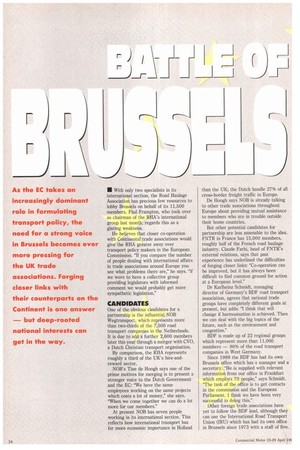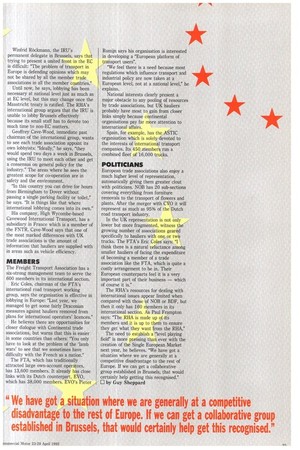As the EC takes an increasingly dominant role in formulating
Page 26

Page 27

If you've noticed an error in this article please click here to report it so we can fix it.
transport policy, the need for a strong voice in Brussels becomes ever more pressing for the UK trade associations. Forging closer links with their counterparts on the Continent is one answer — but deep-rooted national interests can get in the way.
• With only two specialists in its international section, the Road Haulage Association has precious few resources to lobby Brussels on behalf of its 11,500 members. Paul Frampton, who took over as chairman of the RHA's international group last month, regards this as a glaring weakness.
He believes that closer co-operation with Continental trade associations would give the RHA greater sway over transport policy makers in the European Commission. "If you compare the number of people dealing with international affairs in trade associations around Europe you see what problems there are," he says. "if we were to have a collective group providing legislators with informed comment we would probably get more sympathetic legislation."
CANDIDATES
One of the obvious candidates for a partnership is the influential NOB Wegtransport, which represents more than two-thirds of the 7,500 road transport companies in the Netherlands. It is due to add a further 2,600 members later this year through a merger with CVO, a Dutch Christian transport organisation.
By comparison, the RHA represents roughly a third of the UK's hire-andreward sector.
NOB's Tine de Hoogh says one of the prime motives for merging is to present a stronger voice to the Dutch Government and the EC: "We have the same employees working on the same projects which costs a lot of money," she says. "When we come together we can do a lot more for our members."
At present NOB has seven people working in its international section. This reflects how international transport has far more economic importance in Holland than the UK; the Dutch handle 27% of all cross-border freight traffic in Europe.
De Hoogh says NOB is already talking to other trade associations throughout Europe about providing mutual assistance to members who are in trouble outside their home countries.
But other potential candidates for partnership are less amenable to the idea. FNTR in France has 15,000 members, roughly half of the French road haulage industry. Claude Farhi, head of FNTR's external relations, says that past experience has underlined the difficulties of forging closer links: "Co-operation can be improved, but it has always been difficult to find common ground for action at a European level."
Dr Karlheinz Schmidt, managing director of Germany's BDF road transport association, agrees that national trade groups have completely different goals at present, but adds: "I think that will change if harmonisation is achieved. Then we can deal with the big topics of the future, such as the environment and congestion."
BDF is made up of 22 regional groups which represent more than 11,000 members — 90% of the road transport companies in West Germany.
Since 1989 the BDF has had its own Brussels office which has a manager and a secretary. "He is supplied with relevant information from our office in Frankfurt which employs 70 people," says Schmidt. The task of the office is to get contacts in the commission and the European Parliament. I think we have been very successful in doing this."
Other foreign trade associations have yet to follow the BDF lead, although they can use the International Road Transport Union (IRU) which has had its own office in Brussels since 1973 with a staff of five. Winfrid ROckmann, the IRU's permanent delegate in Brussels, says that trying to present a united front in the EC is difficult: The problem of transport in Europe is defending opinions which may not be shared by all the member trade associations in all the member countries."
Until now, he says, lobbying has been necessary at national level just as much as at EC level, but this may change once the Maastricht treaty is ratified. The RHA's international group argues that the IRU is unable to lobby Brussels effectively because its small staff has to devote too much time to non-EC matters.
Geoffrey Cave-Wood, immediate past chairman of the international group, wants to see each trade association appoint its own lobbyists: "Ideally," he says, "they would spend two days a week in Brussels, using the IRU to meet each other and get a consensus on general policy for the industry." The areas where he sees the greatest scope for co-operation are in safety and the environment.
"In this country you can drive for hours from Birmingham to Dover without passing a single parking facility or toilet," he says. "It is things like that where international lobbying comes into its own."
His company, High Wycombe-based Cavewood International Transport, has a subsidiary in France which is a member of the FNTR.. Cave-Wood says that one of the most marked differences with UK trade associations is the amount of information that hauliers are supplied with in areas such as vehicle efficiency.
MEMBERS
The Freight Transport Association has a six-strong management team to serve the 600 members in its international section.
Eric Coles, chairman of the FTA's international road transport working group, says the organisation is effective in lobbying in Europe: "Last year, we managed to get some fairly Draconian measures against hauliers removed from plans for international operators' licences."
He believes there are opportunities for closer dialogue with Continental trade associations, but warns that this is easier in some countries than others: "You only have to look at the problem of the 'lamb wars' to see that we sometimes have difficulty with the French as a nation."
The FTA, which has traditionally attracted large own-account operators, has 13,600 members. It already has close links with its Dutch counterpart, EVO, which has 38,000 members. EVO's Pieter Ron* says his organisation is interested in developing a "European platform of transport users".
"We feel there is a need because most regulations which influence transport and industrial policy are now taken at a European level, not at a national level," he explains.
National interests clearly present a major obstacle to any pooling of resources by trade associations, but UK hauliers probably have most to gain from closer links simply because continental organisations pay far more attention to international affairs.
Spain, for example, has the ASTIC organisation which is solely devoted to the interests of international transport companies. Its 450 members run a combined fleet of 16,000 trucks.
POLITICIANS
European trade associations also enjoy a much higher level of representation, automatically giving them greater clout with politicians. NOB has 20 sub-sections covering everything from furniture removals to the transport of flowers and plants. After the merger with CVO it will represent as much as 95% of the Dutch road transport industry.
In the UK representation is not only lower but more fragmented, witness the growing number of associations geared specifically to hauliers with one or two trucks. The FTA's Eric Coles says: "I think there is a natural reluctance among smaller hauliers of facing the expenditure of becoming a member of a trade association like the FTA, which is quite a costly arrangement to be in. Their European counterparts feel it is a very important part of their business — which of course it is."
The RHA's resources for dealing with international issues appear limited when compared with those of NOB or BDF, but then it only has 160 members in its international section. As Paul Frampton says: "The RHA is made up of its members and it is up to them to ensure they get what they want from the RHA,"
The need to establish a "level playing field" is more pressing than ever with the creation of the Single European Market next year, he believes. "We have got a situation where we are generally at a competitive disadvantage to the rest of Europe. If we can get a collaborative group established in Brussels, that would certainly help getting this recognised." LI by Guy Sheppard
















































































